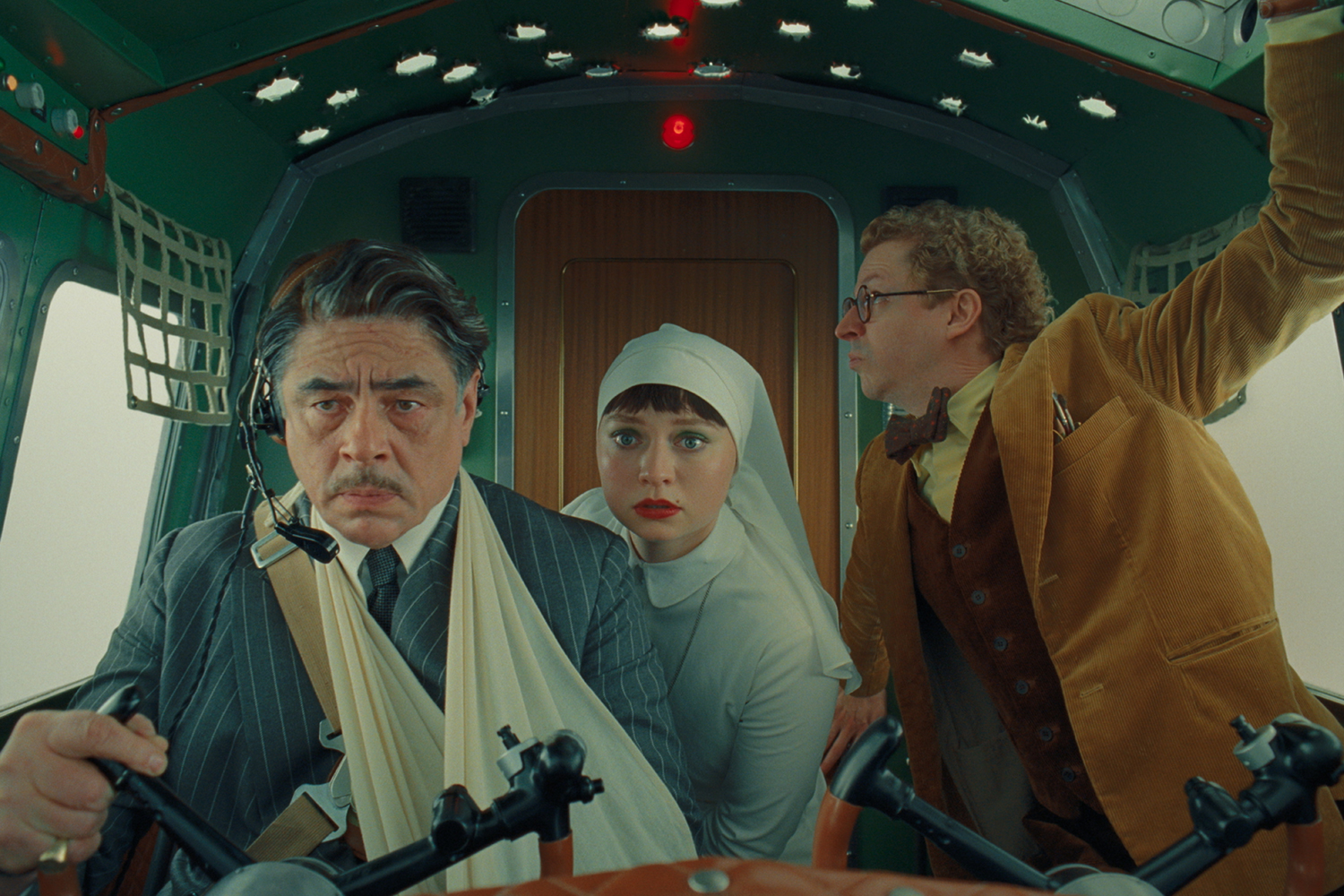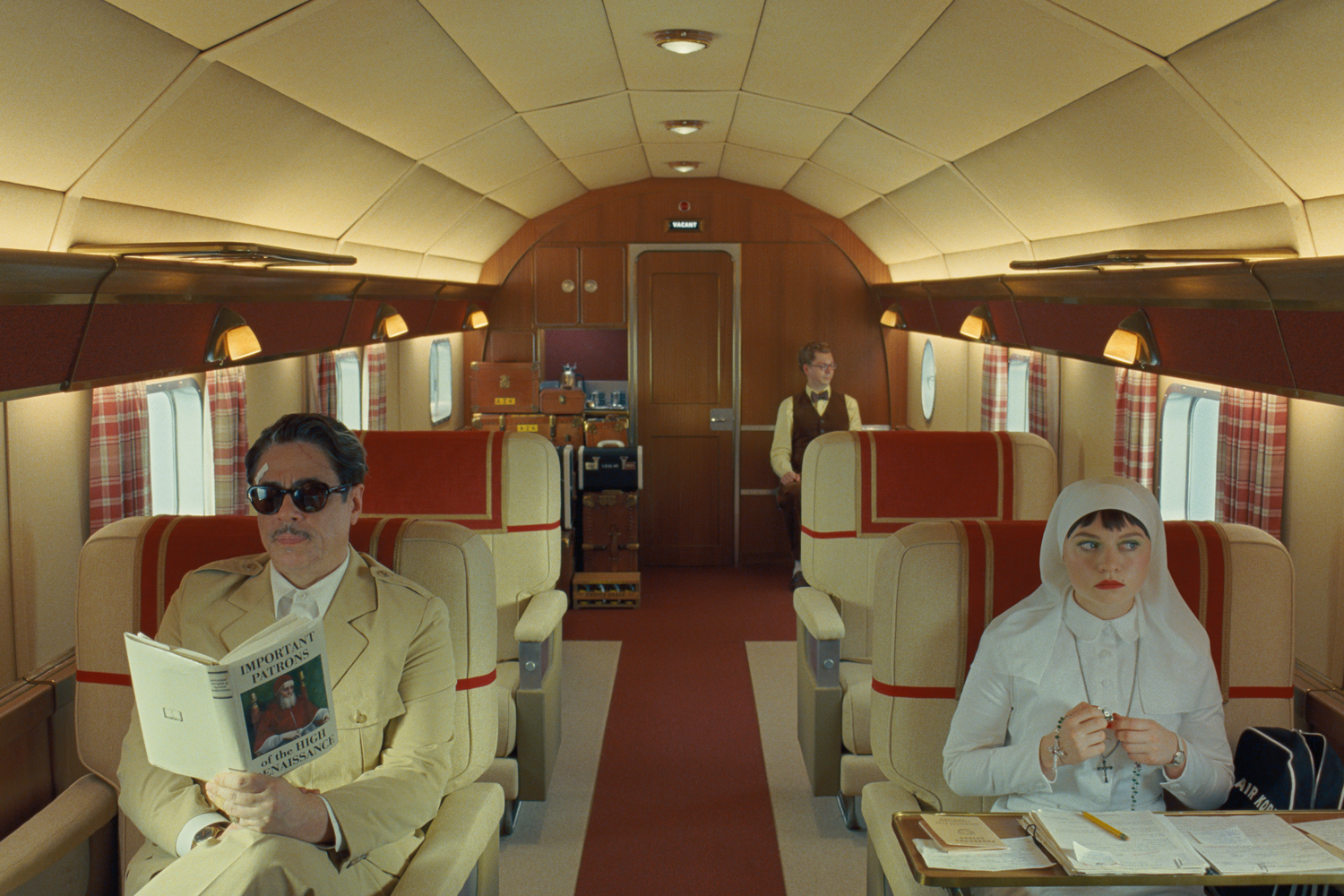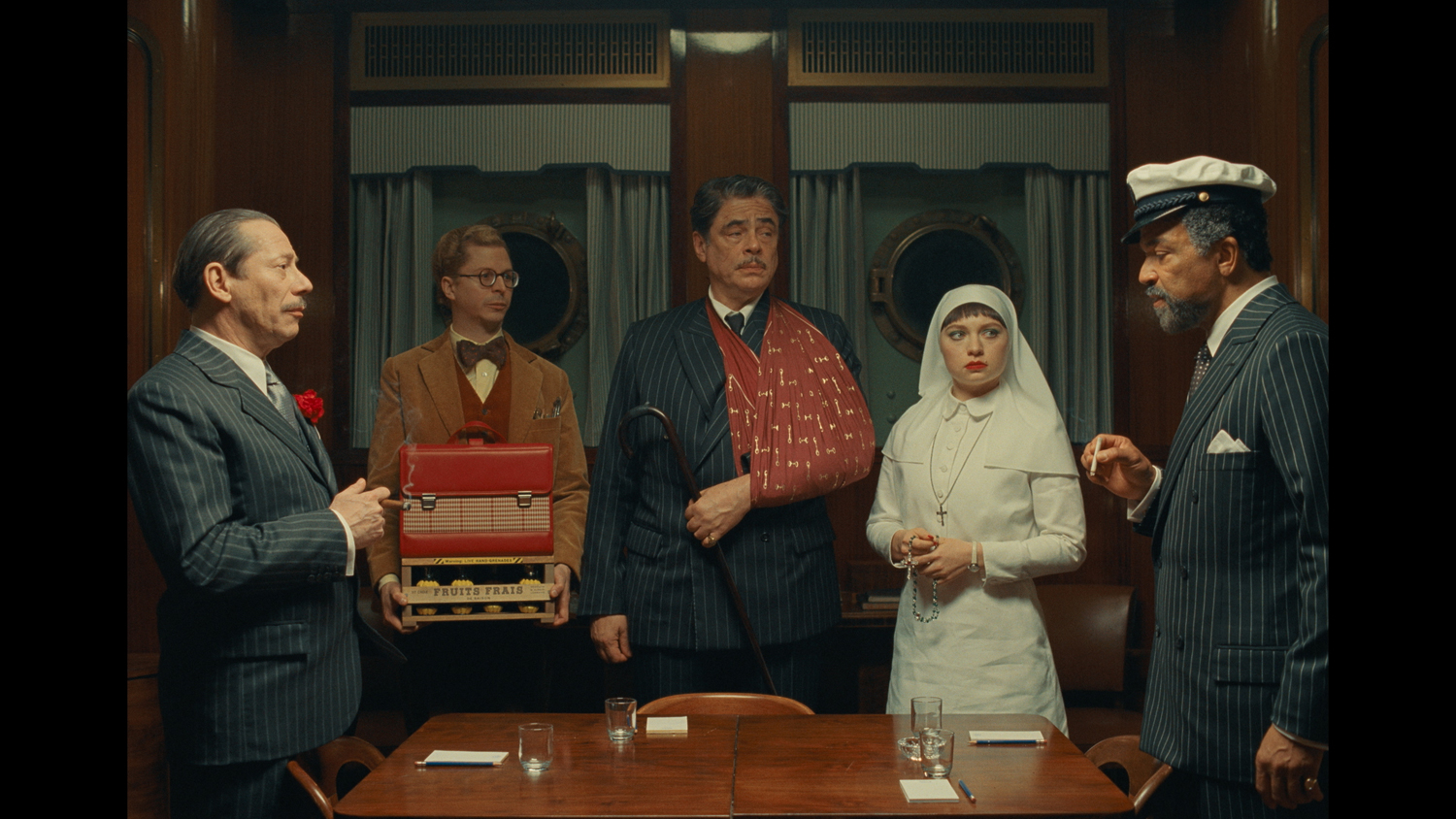
Benicio Del Toro as Zsa-zsa Korda, Michael Cera as Bjorn and Mia Threapleton as Liesl in a scene from "The Phoenician Scheme." (Photo courtesy of Focus Features)
You've probably heard the complaints. You may even agree with them. Wes Anderson's films are pretentious, his detractors say. Fussy, mechanical contraptions that squeeze their big-name ensemble casts into meticulously crafted dioramas that feel like they've been storyboarded within an inch of their life. His naysayers insist they're the product of an aesthete with zero connection to or interest in the real world that keeps on turning while he's safely ensconced in his bubble.
But this critic has been eager to step into this bubble ever since “Rushmore,” Anderson's virtuoso prep school comedy starring Bill Murray and a 17-year-old Jason Schwartzman, knocked my socks off back in 1998. The curlicues and sleight-of-hand flourishes are the proscenium for some thorny exploration of dysfunctional families, whether they are makeshift or biological. These characters' lives are messy, chaotic even. Despite the ornate dialogue, these people feel all too real, be they flesh and blood or puppets brought to life by stop-motion animation, the opposite of what the filmmaker's critics would have you believe.

Benicio Del Toro as Zsa-zsa Korda in a scene from "The Phoenician Scheme." (Photo courtesy of Focus Features)
Sure, not all of Anderson's efforts have been home runs, and to be honest, I find the two films regarded as the pinnacle of his creative powers, “The Royal Tenenbaums” and “The Grand Budapest Hotel,” to be marred by a mean streak that pokes its head at several intervals throughout his body of work. But there's always something for viewers to “ooh” and “aah” over. There's no doubt that this auteur, now 56, loves movies, and the movies love him right back. His work is, to borrow that overused word, iconic, the kind of cinema propelled by a vast imagination and a refreshingly analog bag of tricks.
Sitting through “The Phoenician Scheme,” Anderson's airless, curiously remote portrait of a weaselly tycoon, his estranged daughter and a globe-trotting scavenger hunt for capital with danger at every step, I grew restless, looking for that creative spark that gives the director's films their kick. Sadly, it was nowhere in sight.

Benicio Del Toro as Zsa-Zsa Korda, Michael Cera as Bjorn and Mia Threapleton as Liesl in a scene from "The Phoenician Scheme." (Photo courtesy of Focus Features)
Instead, the period comedy trots out situations and characters that feel like subpar variations on people who've crossed our path in previous Anderson films, mostly reminiscent of “The Life Aquatic,” with a dash of “Tenenbaums” thrown in for good measure. What's missing is that fresh, zippy energy that keeps viewers interested in seeing how things turn out, making this visit to Andersonland feel tired and rote.
The movie feels off from the get-go, as self-absorbed industrialist Anatole “Zsa-zsa” Korda (Benicio Del Toro) survives yet another assassination attempt circa 1950, this time involving an explosive in his private plane and a burst of violence that plays into the casual cruelty that turns me off about Anderson, couched in gallows humor that informs a considerable chunk of the film.

Benicio Del Toro as Zsa-zsa Korda, Bryan Cranston as Reagan, Tom Hanks as Leland and Mia Threapleton as Liesl in a scene from "The Phoenician Scheme." (Photo courtesy of TPS Productions/Focus Features)
Zsa-zsa, accurately described as “a controversial figure,” may have perfected a knack for cheating the Grim Reaper, but that ability has not translated into a stable business career, despite his fortune, or a fulfilling personal life. His latest brush with death hammers home the reality that his empire is in tatters, so he summons his only daughter, Liesl (Mia Threapleton), from the convent where she is preparing to take her vows, and asks her to help him. Okay, “ask” might not be case here, since the deeply resentful novitiate doesn't really have a say in the matter.
Zsa-zsa's mission: to secure funding needed to save a number of infrastructural projects in the Mediterranean region of Phoenicia. In other words, they're going go around asking business associates and other figures in Zsa-zsa's past for money. They're joined by Bjørn (Michael Cera), a Norwegian entomologist Zsa-zsa has hired as a tutor for Liesl. Cue the famous faces, whimsical scenarios, elaborately staged melees and vexing setbacks, as the trio encounter peril in increasingly dicey depictions of Murphy's Law.
Peppered in between the “waking world” moments are apparent dream sequences. These are shot in black and white by cinematographer Bruno Delbonnel and show Zsa-zsa appearing to stand trial in some kind of austere celestial court, playing like an SNL skit poking fun at “The Tragedy of Macbeth,” director Joel Coen's foray into Shakespeare. They're not particularly funny, just eerie, and like just about everything else in “The Phoenician Scheme,” they land with a dull thud, even with Anderson regular Murray playing God.

Bill Murray as God in a scene from "The Phoenician Scheme." (Photo courtesy of TPS Productions/Focus Features)
You can't really fault the cast here, even though Cera is occasionally grating as the aloof academic who's more observant than he lets on. In a rare starring role for Del Toro, Zsa-zsa fits the Oscar winner like a glove, and Threapleton brings deadpan moxie to Liesl, whose crisis of faith yields some of the scant chuckles that “Scheme” has to offer. But for all the frenetic comings and goings and dering-do, as well as Delbonnel's nifty compositions (shot for the most part in a boxy 1.48:1 aspect ratio), the film feels stuck in neutral. There is a pulse, but it's rather faint, as Anderson goes through the motions.

Mathieu Amalric as Marseille Bob, Michael Cera as Bjorn, Benicio Del Toro as Zsa-zsa Korda, Mia Threapleton as Liesl and Jeffrey Wright as Marty in a scene from "The Phoenician Scheme." (Photo courtesy of TPS Productions/Focus Features)
There's no way around it: An exciting filmmaker has made an unexciting movie. Anderson reaches a creative dead end here, marking the first time I can relate to his vocal dissenters. What makes it doubly disheartening is that this comes after Anderson turned in some of his best work in ages: the richly layered (and divisive) Atomic Age romp “Asteroid City,” and his adaptations of four Roald Dahl stories released by Netflix, including the stellar “The Wonderful Story of Henry Sugar.”
“The Phoenician Scheme” is a precipitous step down, an arch, exasperating misfire that will hopefully prompt Anderson to take a time out and recharge his batteries. In the meantime, we'll have to make do with this batch of recycled goods. It really didn't have to be this way. You've been there, done that and probably bought the Criterion Blu-ray.
“The Phoenician Scheme” is now playing across South Florida, including Coral Gables Art Cinema, Regal South Beach, Silverspot Cinema in downtown Miami, Cinépolis Cinemas in Coconut Grove, AMC Aventura, Cinema Paradiso Hollywood, Regal Dania Pointe and Paradigm Cinemas: Gateway Fort Lauderdale.




